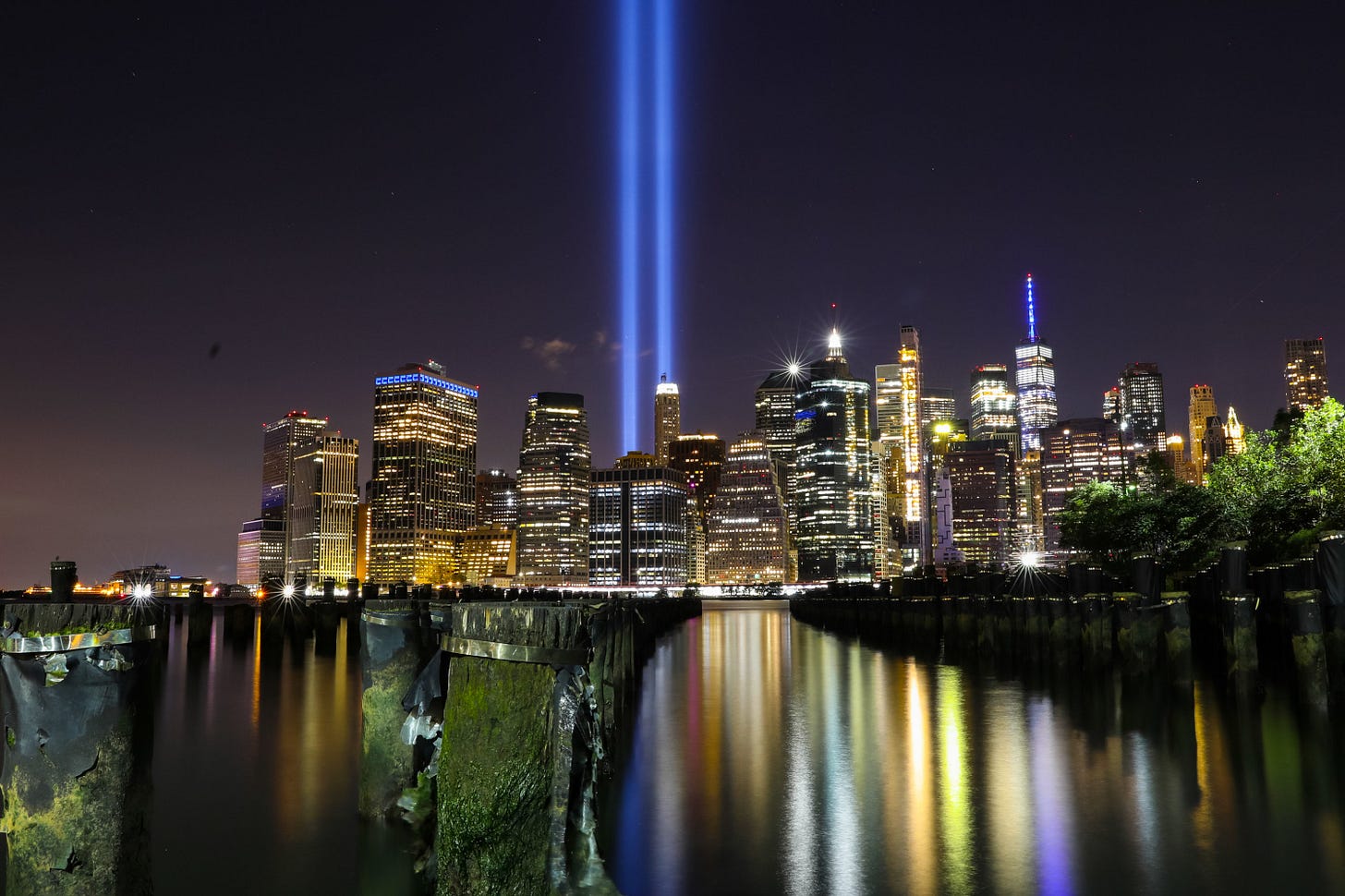9/11 Passes into History
Sometimes the past is . . . the past.
This September 11 we will, as we should, commemorate the twentieth anniversary of September 11, 2001. Of the September 11. Of 9/11.
We will, as we should, mourn the loss of those who perished that day. We will, as we should, celebrate the heroism of those who responded on that day. We will, as we should, honor the emergency responders in New York and Washington, and the passengers and crew of Flight 93.
We will also, as we should, honor those who responded in subsequent years—those who volunteered to join the fight to prevent another 9/11, who took the battle to the terrorists and halted the momentum of Islamist extremism. Those who tried to change the conditions in far-off lands that made it possible for terrorism to fester and flourish in the first place.
The twentieth anniversary ceremonies will be moving. But what strikes me—or is this just an idiosyncratic reaction?—is that these ceremonies will feel historical.
It’s hard to put one’s finger on just when or why September 11 somehow jumped, as I believe it has, from the category of current events to history. Perhaps it’s simply that two decades is a long time. Perhaps it’s also because, as Jonathan Last suggested, the America of 2001 seems to have more in common with that of 1981 than that of 2021. Perhaps it has to do with a point Mona Charen makes:
This enemy was in some respects like our old enemy, communism. Islamism was a coherent worldview. It had global ambitions. It provided existential certitude. Like communism, it disdained pluralism and freedom of thought and expression. It ruthlessly suppressed dissent. In some ways it was therefore a familiar adversary. It felt like the latest despotic, fanatical ideology to challenge us, following fascism and communism.
What this would imply, then, is that 9/11, and the reactions to 9/11, were not the beginning of a new era, as we tended to think at the time. Rather, 9/11 was a kind of coda to the Cold War—an era which has now, finally, for better or worse, ended.
But however all that may be, it does feel that 9/11 now belongs to history. When one reads debates about the meaning of 9/11 and the consequences of 9/11 and the consequences of our reactions to 9/11, these feel like historical debates.
Now debates about historical choices and historical consequences are important. History’s lessons should be debated and remembered. They can and should inform our choices going forward. But they are still fundamentally historical, rather than contemporary.
I don’t think we ought to lament 9/11 moving, so to speak, into the rearview mirror.
Yes, one can complain that the present age is too present-oriented. Perhaps we should live with the past more at our elbow, more in our gaze, more present to our mind.
Perhaps it was healthier when more people nodded approvingly in response to Faulkner’s claim (or rather the claim of one of his characters) that “The past is never dead. It’s not even past.”
Or maybe that wasn’t so healthy. Maybe it’s sometimes better—both healthier and truer—to let the past be . . . the past.
To let the past be past is in no way disrespectful of the memories of those who died on 9/11 or of those who responded so nobly, either on that day or since. We can continue to mourn terrible sorrows. We can continue to honor brave acts.
But consider this: At the time, the attack of September 11 was sometimes compared to Pearl Harbor.
Yet even Pearl Harbor—which set off America’s involvement in the war that shaped nearly every aspect of the modern world—became part of our past. And here’s what’s striking: That transition itself happened in less than two decades.
On December 7, 1961, President John F. Kennedy spoke to the AFL-CIO annual convention in Miami. After introductory pleasantries, Kennedy commented that
“This is an important anniversary for all of us, the twentieth anniversary of Pearl Harbor.”
He went on to note, “I suppose, really, the only two dates that most people remember where they were, were Pearl Harbor and the death of President Franklin Roosevelt.”
He continued, “We face entirely different challenges on this Pearl Harbor.”
And that was it. The last mention of Pearl Harbor on Pearl Harbor Day. Instead, President Kennedy went on to discuss the economic challenges of the 1960s.
Two decades is a long time.
We have different challenges today, too. For instance, a major political party in thrall to right-wing authoritarianism. And illiberal extremism is flourishing on all sides of the political spectrum. And our nation has exhibited manifest failures—from the elites to the general public—in dealing with a deadly pandemic.
Alas, there is no easy guidance from the history of the 9/11 era—or I dare say the pre-9/11 era, either. We’re in uncharted waters.
Maybe that’s at least the beginning of the wisdom we need. That we don’t know what comes next.
That, as Lincoln put it,
“The dogmas of the quiet past are inadequate to the stormy present. The occasion is piled high with difficulty, and we must rise with the occasion. As our case is new, so we must think anew, and act anew.”
That too is a lesson of history.



